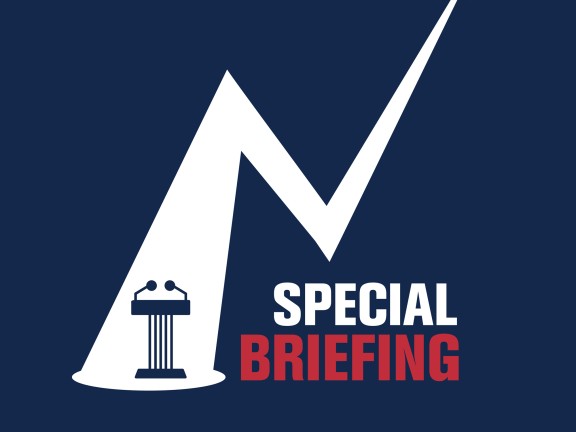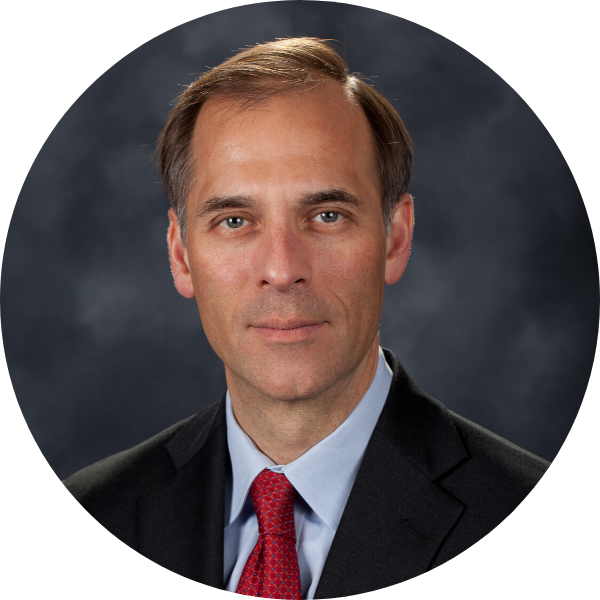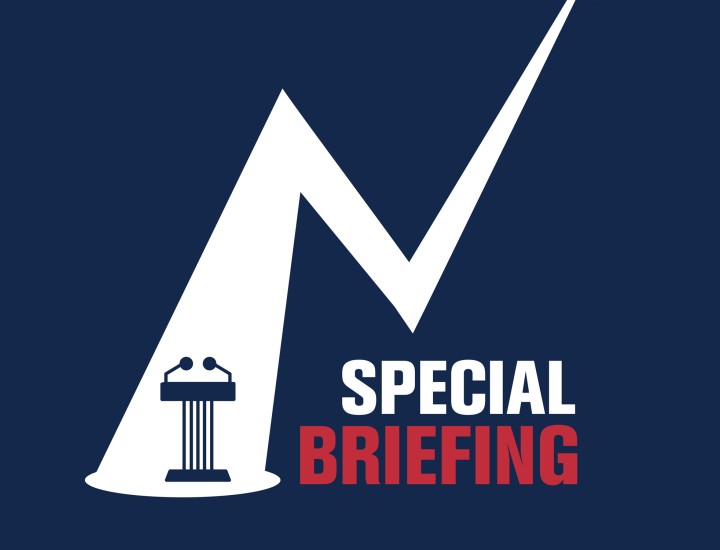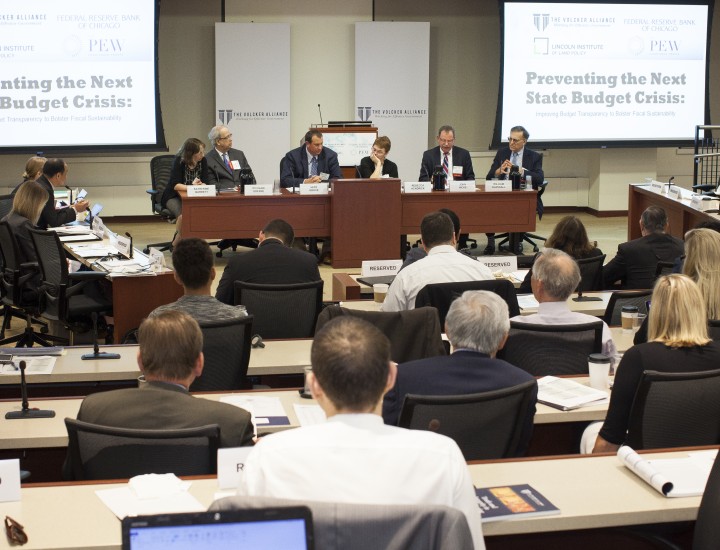Special Briefing: Stagflation Ahead? Inflation and Recession

11:00AM
The Volcker Alliance and Penn Institute for Urban Research hosted an online Special Briefing on the likelihood of stagflation and recession as inflationary pressures continue to impact the US economy as well as the outlook for states and municipalities.
Our panel of experts included Alison Premo Black, senior vice president and chief economist, American Road & Transportation Builders Association; Beth Ann Bovino, US chief economist and managing director, S&P Global Ratings; Hughey Newsome, chief financial officer, Wayne County, Michigan; Gabriel Petek, legislative analyst, State of California; and Mark Zandi, chief economist, Moody’s Analytics.
Moderated by William Glasgall, Volcker Alliance senior director, public finance, and Penn IUR Fellow, and Susan Wachter, co-director of Penn IUR, this briefing was the thirty-fourth in a series of sixty-minute online conversations featuring experts from the national research networks of the Volcker Alliance and Penn IUR, along with other leading academics, economists, and federal, state, and local leaders.
Special Briefings are made possible by funding from The Century Foundation, the Volcker Alliance, and members of the Penn IUR Advisory Board.
Recordings of the entire Special Briefings series are available on the Volcker Alliance website: SPECIAL BRIEFING SERIES ARCHIVE.
Special Briefing Episode Summary:
Inflation Brings Fiscal Challenges, Recession Risk
By Stephen Kleege, Volcker Alliance Special Project Consultant
- “We’re at the precipice of a wage-price spiral” economist warns
- Rising costs for labor and materials constrain infrastructure projects
- California sees flat revenue growth ahead
- Competition for staff heats up in tight labor market
The fiscal outlook grew cloudier for state and local governments as the latest report on consumer prices showed persistent inflation, signaling a greater likelihood of recession as the Federal Reserve responds by raising interest rates, panelists said at a September 15 Special Briefing by the Volcker Alliance and Penn Institute for Urban Research.
“We’re at the precipice of a wage-price spiral,” though a repeat of 1970s-style stagflation remains unlikely, said Beth Ann Bovino, US chief economist and managing director, S&P Global Ratings. She noted the Fed’s more aggressive response to the current surge in prices and greater flexibility in labor markets than in the 1970s, when unions wielded more power and more wage contracts were indexed to inflation.
Moderated by William Glasgall, Volcker Alliance senior director, public finance, and Penn IUR Fellow, and Susan Wachter, co-director of Penn IUR, this briefing was the thirty-fourth in a series of sixty-minute online conversations featuring experts from the national research networks of the Volcker Alliance and Penn IUR, along with other leading academics, economists, and federal, state, and local leaders.
In addition to Bovino, panelists included, Mark Zandi, chief economist, Moody’s Analytics; Alison Premo Black, senior vice president and chief economist, American Road & Transportation Builders Association; Gabriel Petek, legislative analyst, State of California; and Hughey Newsome, chief financial officer, Wayne County, Michigan.
The webinar came two days after the US Consumer Price Index excluding food and energy unexpectedly rose by 6.3 percent in August over the level of a year ago. Wachter said the worse-than-expected report raised the possibility that the Fed would increase its benchmark rate by a full percentage point at its September 21-22 meeting, rather than the 0.75-point move that was anticipated in financial markets.
“I was disappointed and disconcerted by the CPI number. It shows that inflation is broad-based and feels more entrenched than I would have thought,” Zandi said. “Continued acceleration in rent growth … may be more of an issue for longer than I expected.” He also noted rapidly rising wages in the health care sector due to the Covid-19 pandemic and said he sees fifty-fifty chance of a recession by the latter part of 2023 or early 2024.
Illustrating the pressure this is putting on budgets, Glasgall said New Jersey plans to cover much of a 21 percent increase in medical insurance premiums for state workers.
Inflation also is taking a toll on transportation spending as governments start to implement Covid relief and infrastructure programs. Higher costs and the lack of availability of materials “is having an impact on bid prices and how far some of these dollars are going to stretch,” Black said. “We’re facing issues of labor. We’re adding a number of jobs in heavy construction in the industry but wages are up, those employees are working more hours, and we also have low unemployment and a lot of job openings. So there is pressure there.”
California in May began to incorporate the increased risk of recession into its budget forecasts based on inflation and low unemployment, a slowing housing market, falling consumer confidence, and an inversion of the bond yield curve. “Our judgment is it’s been difficult for the Fed to navigate a soft landing” in the economy when those conditions exist, Petek said. After two years of strong growth in state tax revenues, he said, “we’re calling for pretty flat revenue growth over the next several years.” His office also sees a 70 percent likelihood that tax revenue will be below budget assumptions in the current fiscal year.
Wayne County, where Detroit is situated, is reliant on property taxes for revenue, but limited in how much money it can collect in an inflationary environment, Newsome said. “Costs continue to go up for the county, however we can’t necessarily capture the entire growth or appreciation in taxable values,” he said. Newsome said the county faces an increased challenge in providing services as it tries to compete with the private sector for workers in the tight labor market. Inflation is “starting to really hit us now,” he said
 Dr. Alison Premo Black serves as senior vice president and chief economist for ARTBA. She oversees the association’s Transportation Investment Advocacy Center and the Transportation Officials, and the Research and Education Divisions.
Dr. Alison Premo Black serves as senior vice president and chief economist for ARTBA. She oversees the association’s Transportation Investment Advocacy Center and the Transportation Officials, and the Research and Education Divisions.
Dr. Black manages ARTBA’s economics staff and is responsible for over 100 studies examining national and state transportation funding and investment patterns, including the association’s landmark economic profile of the transportation construction industry, state bridge condition profiles, federal-aid highway dashboard, and annual modal forecast.
She has been interviewed numerous times as an industry expert for national and local print, television and radio, including the NBC TODAY show, the Washington Post, NPR, USA Today, the Wall Street Journal, The Economist and industry publications. She has testified before state legislative committees in Illinois, Kansas, New Jersey, North Carolina, Tennessee, and Pennsylvania.
Dr. Black completed her PhD in Economics at The George Washington University and holds an MA in International Economics and Latin American Studies from the Johns Hopkins School of Advanced International Studies (SAIS). Dr. Black graduated magna cum laude from Syracuse University with majors in International Relations, Latin American Studies and Spanish. She is a member of the Phi Beta Kappa and Golden Key Honors Societies, and a recipient of the Syracuse Remembrance Scholarship. A native of the Eastern Shore of Maryland, Dr. Black resides in Washington, DC, with her husband and four children.
 Beth Ann Bovino is the US Chief Economist and Managing Director at S&P Global Ratings Services, based in New York. In this position, she develops S&P’s U.S. economic forecasts and authors the quarterly U.S. Economic Forecast, the biweekly Financial Notes and the Business Cycle Barometer. Beth Ann has written timely research reports on long‐term economic trends and has created industry drivers for analyst research. She is quoted regularly in the press and has appeared on many major television programs. Further, she has written many articles for popular and professional publications.
Beth Ann Bovino is the US Chief Economist and Managing Director at S&P Global Ratings Services, based in New York. In this position, she develops S&P’s U.S. economic forecasts and authors the quarterly U.S. Economic Forecast, the biweekly Financial Notes and the Business Cycle Barometer. Beth Ann has written timely research reports on long‐term economic trends and has created industry drivers for analyst research. She is quoted regularly in the press and has appeared on many major television programs. Further, she has written many articles for popular and professional publications.
Before joining Standard & Poor’s in February 2004, Beth Ann spent over ten years doing economic and market research with Sungard Institutional Brokerage, UBS Warburg, and the Federal Reserve.
The Wall Street Journal recognized Beth Ann as the most accurate forecaster of the U.S. economy in 2013, and the second most accurate forecaster of the U.S. economy in 2018. The YWCA honored Beth Ann for her work on women in the workforce, inducting her into their YW Academy of Women Leaders at their 45th Salute Luncheon in 2018.
Beth Ann holds a bachelor’s degree in Economics from the Wharton School at the University of Pennsylvania, a master's degree in International and Development Economics from Yale University and a Ph.D. in Economics from Columbia University.
 Hughey Newsome is chief financial officer for Wayne County, Michigan. An experienced finance executive with expertise in the public sector space and experience across multiple industries, Newsome has also served as CFO in Flint, Michigan, interim CFO in Pontiac, Michigan, and as senior manager at MorganFranklin Consulting, a strategy and execution-focused business consulting firm. He holds a MBA in finance from Harvard Business School, an MS in electrical engineering from Stanford University, and a bachelor of science degree in electrical engineering from University of Arkansas. He is a Certified Government Financial Manager and a director at the Audubon Naturalist Society.
Hughey Newsome is chief financial officer for Wayne County, Michigan. An experienced finance executive with expertise in the public sector space and experience across multiple industries, Newsome has also served as CFO in Flint, Michigan, interim CFO in Pontiac, Michigan, and as senior manager at MorganFranklin Consulting, a strategy and execution-focused business consulting firm. He holds a MBA in finance from Harvard Business School, an MS in electrical engineering from Stanford University, and a bachelor of science degree in electrical engineering from University of Arkansas. He is a Certified Government Financial Manager and a director at the Audubon Naturalist Society.

Gabriel Petek was appointed to the position of the Legislative Analyst in February 2019, as the sixth person to serve in that capacity since the office was founded in 1941. As the Legislative Analyst, Gabriel serves as the nonpartisan fiscal advisor to both houses of the California Legislature and oversees the preparation of fiscal and policy analyses of the state’s budget and programs. His office is also responsible for preparing impartial analyses of all initiatives and constitutional measures qualifying for the state’s ballot.
Before joining the office, Gabriel worked for two decades at S&P Global Ratings. Gabriel held several positions at S&P before he was ultimately named the Managing Director and Sector Leader in the U.S. States Group of the U.S. Public Finance Division in San Francisco. Gabriel was S&P’s primary analyst for the states of California and Illinois.
Gabriel graduated with a Master in Public Policy from Harvard University’s Kennedy School of Government, during which time he interned at the City of Boston’s Office of Management and Budget. In addition, he earned his B.A., magna cum laude, in political science from Loyola Marymount University, with a portion of his undergraduate coursework completed through his participation in the Hansard Scholars Programme at the London School of Economics and Political Science. Gabriel holds the Chartered Financial Analyst (CFA) designation and has served as an advisor to the Government Finance Officer’s Association’s Committee on Governmental Budgeting and Fiscal Policy. He currently serves on the Statewide Leadership Council of the Public Policy Institute of California.
 Mark M. Zandi is chief economist of Moody’s Analytics, where he directs economic research. Moody’s Analytics, a subsidiary of Moody’s Corp., is a leading provider of economic research, data and analytical tools. Dr. Zandi is a cofounder of Economy.com, which Moody’s purchased in 2005. Dr. Zandi is on the board of directors of MGIC, the nation’s largest private mortgage insurance company, and is the lead director of Reinvestment Fund, one of the nation’s largest community development financial institutions, which makes investments in underserved communities. He is a trusted adviser to policymakers and an influential source of economic analysis for businesses, journalists and the public. Dr. Zandi frequently testifies before Congress and conducts regular briefings on the economy for corporate boards, trade associations, and policymakers at all levels. He is often quoted in national and global publications and interviewed by major news media outlets, and is a frequent guest on CNBC, NPR, Meet the Press, CNN, and various other national networks and news programs.
Mark M. Zandi is chief economist of Moody’s Analytics, where he directs economic research. Moody’s Analytics, a subsidiary of Moody’s Corp., is a leading provider of economic research, data and analytical tools. Dr. Zandi is a cofounder of Economy.com, which Moody’s purchased in 2005. Dr. Zandi is on the board of directors of MGIC, the nation’s largest private mortgage insurance company, and is the lead director of Reinvestment Fund, one of the nation’s largest community development financial institutions, which makes investments in underserved communities. He is a trusted adviser to policymakers and an influential source of economic analysis for businesses, journalists and the public. Dr. Zandi frequently testifies before Congress and conducts regular briefings on the economy for corporate boards, trade associations, and policymakers at all levels. He is often quoted in national and global publications and interviewed by major news media outlets, and is a frequent guest on CNBC, NPR, Meet the Press, CNN, and various other national networks and news programs.
Dr. Zandi is the author of Paying the Price: Ending the Great Recession and Beginning a New American Century, which provides an assessment of the monetary and fiscal policy response to the Great Recession. His other book, Financial Shock: A 360º Look at the Subprime Mortgage Implosion, and How to Avoid the Next Financial Crisis, is described by the New York Times as the “clearest guide” to the financial crisis. Dr. Zandi earned his BS from the Wharton School at the University of Pennsylvania and his PhD at the University of Pennsylvania.


